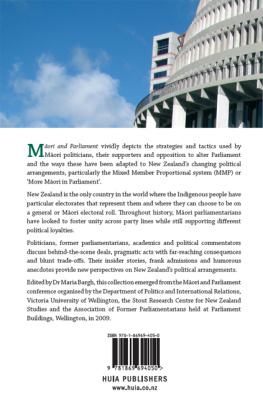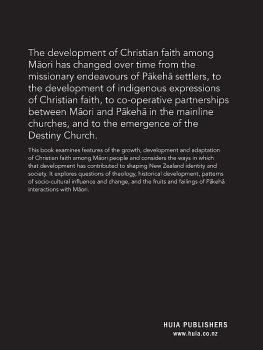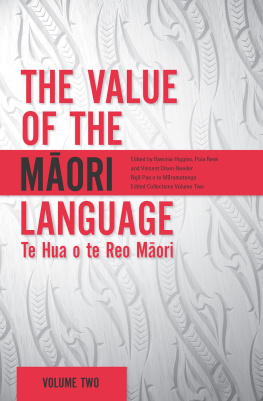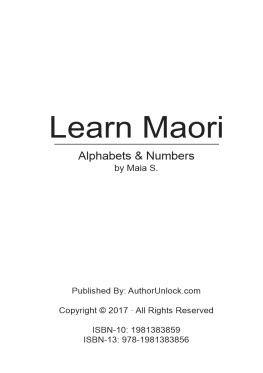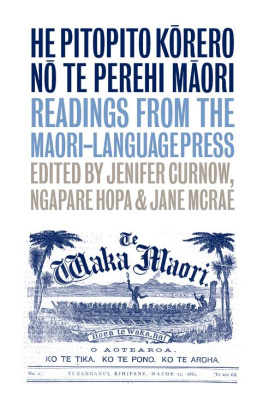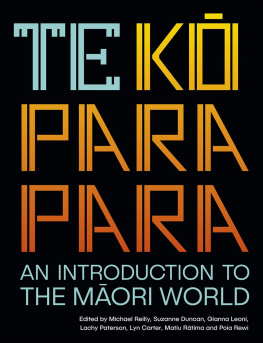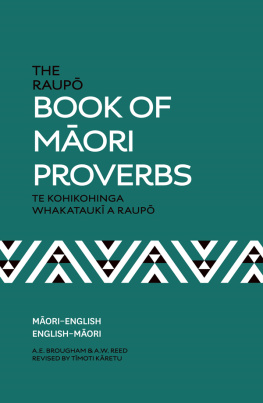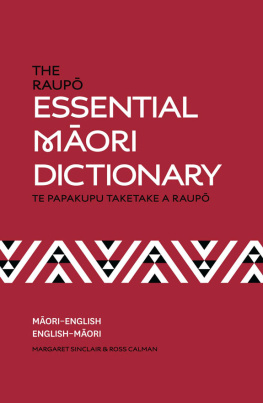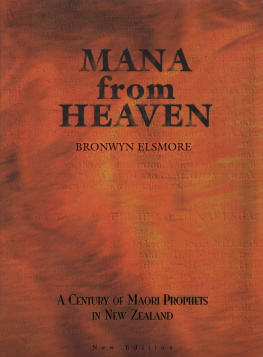Maria Bargh (editor) - Maori and Parliament: Diverse Strategies and Compromises
Here you can read online Maria Bargh (editor) - Maori and Parliament: Diverse Strategies and Compromises full text of the book (entire story) in english for free. Download pdf and epub, get meaning, cover and reviews about this ebook. year: 2011, publisher: Huia (NZ) Ltd, genre: Politics. Description of the work, (preface) as well as reviews are available. Best literature library LitArk.com created for fans of good reading and offers a wide selection of genres:
Romance novel
Science fiction
Adventure
Detective
Science
History
Home and family
Prose
Art
Politics
Computer
Non-fiction
Religion
Business
Children
Humor
Choose a favorite category and find really read worthwhile books. Enjoy immersion in the world of imagination, feel the emotions of the characters or learn something new for yourself, make an fascinating discovery.
- Book:Maori and Parliament: Diverse Strategies and Compromises
- Author:
- Publisher:Huia (NZ) Ltd
- Genre:
- Year:2011
- Rating:4 / 5
- Favourites:Add to favourites
- Your mark:
- 80
- 1
- 2
- 3
- 4
- 5
Maori and Parliament: Diverse Strategies and Compromises: summary, description and annotation
We offer to read an annotation, description, summary or preface (depends on what the author of the book "Maori and Parliament: Diverse Strategies and Compromises" wrote himself). If you haven't found the necessary information about the book — write in the comments, we will try to find it.
Maori and Parliament: Diverse Strategies and Compromises — read online for free the complete book (whole text) full work
Below is the text of the book, divided by pages. System saving the place of the last page read, allows you to conveniently read the book "Maori and Parliament: Diverse Strategies and Compromises" online for free, without having to search again every time where you left off. Put a bookmark, and you can go to the page where you finished reading at any time.
Font size:
Interval:
Bookmark:
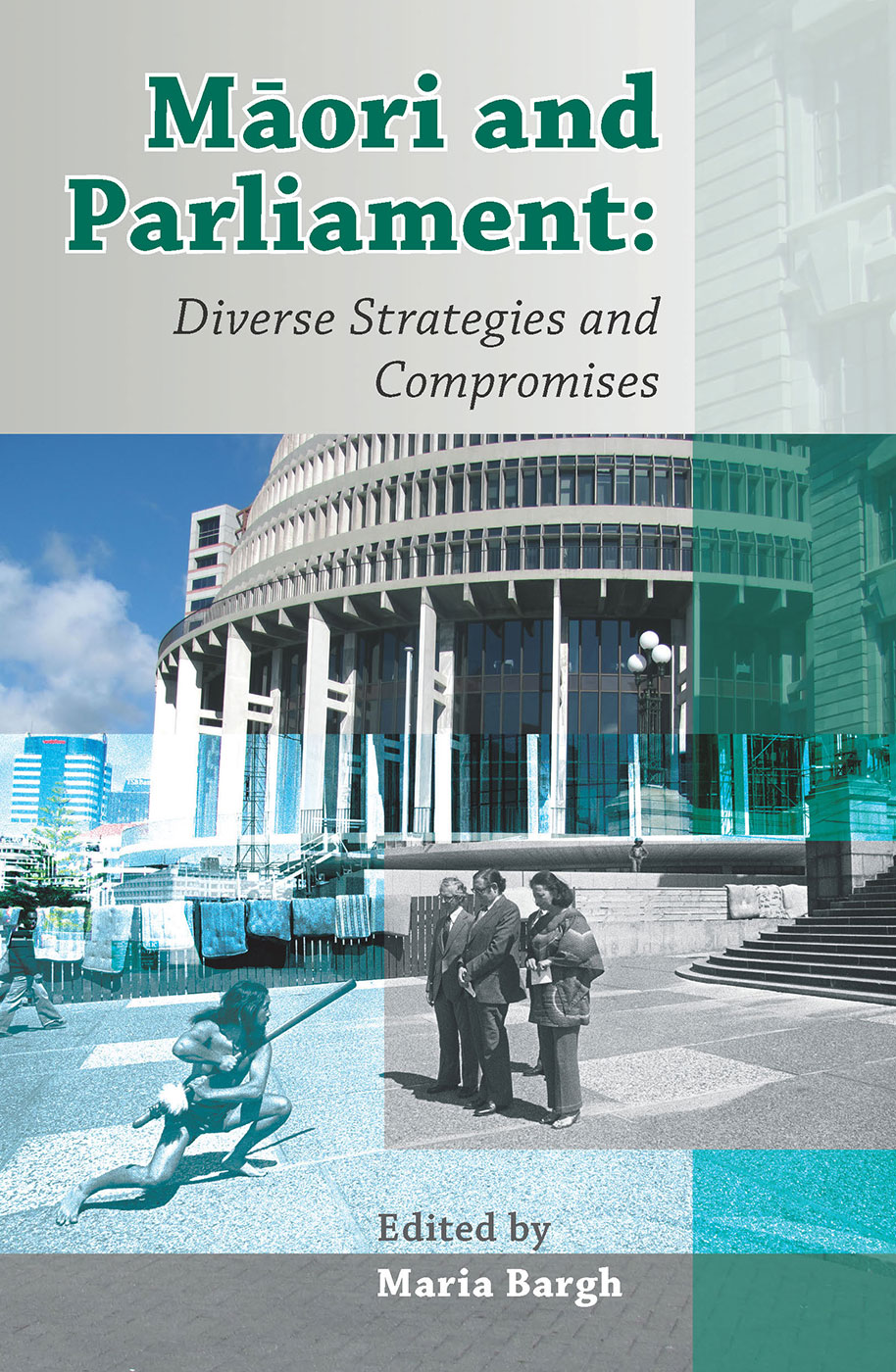


When the Mori Party first entered Parliament in 2005, there was discussion about establishing a Mori caucus within Parliament that would bridge party lines. This aim, of fostering unity in the face of the divisions and conflicting loyalties that weigh on Mori politicians, is a recurring feature in the history of Mori and Parliament. Through the years, and as evidenced in the papers of this book, the tension between unity and separate paths has been a common theme and dilemma for Mori engaged in parliamentary activities. The diversity of strategies of Mori politicians has given rise to an equally diverse range of compromises.
There has never been a singular strategy for all Mori MPs. As a result, the views expressed in this book do not present a coherent or settled account of Mori and Parliament. There is no agreed account. Instead, there is much debate, tension and often humour from across the political spectrum about these issues. In some ways the idea of a Mori caucus that would cross party lines and the fact that it has not come to fruition are representative of this diversity.
New Zealand is at a watershed in its constitutional and political arrangements. Seldom before have Mori held as prominent a position as they do in the current Parliament. There are three events looming in the short term which suggest that the status of Mori in Parliament is in for significant challenge and potentially change. The first is the impending review of constitutional issues and the Mori seats as part of the National PartyMori Party Relationship This may simply reaffirm the status quo and fulfill an election agreement, but could also bring about further pressure for the entrenchment of the Mori seats. The proposed referendum on the future of the mixed member proportional system (MMP) could also have significant implications for Mori given the recent past, which has truly seen MMP produce More Mori in Parliament. Finally, the longer term question of whether New Zealand should become a republic continues to haunt New Zealands political imagination, and would also necessitate lengthy debates about the place of New Zealands constitutional arrangements in relation to Mori rights and Te Tiriti o Waitangi.
The New Zealand Parliament has been a focus for Mori since its establishment in 1854. For many Mori, Parliament represents part of the apparatus that has overridden, marginalised or destroyed the governing and legal structures that existed prior to 1854, and indeed prior to 1840, when Te Tiriti o Waitangi was signed. New Zealands constitutional arrangements have long been seen by Mori as inadequate in terms of supporting the reaffirmations made about hap and iwi tino rangatiratanga in Te Tiriti o Waitangi.
Mori have attempted to alter Parliament, from within and beyond its doors. Many of the contributors to this book (Te Ururoa Flavell, Doug Kidd, Whatarangi Winiata, Metiria Turei) talk about the tactics conspicuous and inconspicuous, short-term and long-term that they have used to alter various aspects of parliamentary life and structures for the benefit of Mori.
The Mori Party is playing a unique role in current attempts to alter Parliament and to exploit the opportunities Parliament may present for Mori tino rangatiratanga aspirations. A dedicated Mori party has not existed in Parliament before with quite the same leverage and perspective as the Mori Party. New Zealand First, after 1996, is perhaps representative, but there is debate over the extent to which it labels itself a Mori party. Other Mori parties, such as Mana Mori Motuhake (established in 1979), Mana Mori (established in 1991) and Mana Wahine te Ira Tangata
Other contributors to this book (Basil Keane and Maria Bargh) discuss ways in which Mori have attempted to alter Parliament from beyond its walls, including through the establishment of Mori parliaments. The Kotahitanga/Mori Parliaments or Premata Mori tried to encourage power sharing, as have, arguably, many types of Mori groups, such as the Kingitanga and the Mori Congress each presenting the Crown with options for constitutional change involving acknowledgment of Te Tiriti o Waitangi or tino rangatiratanga of hap and iwi.
Forces continue to exist in Parliament that constrain the influence Mori might have. A number of the contributors to this book (Georgina Beyer, Nanaia Mahuta and Shane Jones) discuss these constraints in light of how they have affected the kinds of compromises they have had to make individually, and the impact not compromising has had on their careers. Although perhaps the most vividly remembered, Don Brash was not the first or last politician to callously inflame racial tension against Mori. Mori MPs (and the broader Mori public) are always in a vulnerable position, exposed to attack at a whim or for political expediency.
This book is the result of the Mori and Parliament conference held at Parliament in May 2009. The conference was part of a series that has been the work of the Department of Politics and International Relations, Victoria University of Wellington, the Stout Research Centre for New Zealand Studies and the Association of Former Parliamentarians. Professor Margaret Clark, who has been at the forefront of organising the conferences, has edited seven books that have resulted from the previous conferences. Each conference has been recorded and sound records lodged with the National Library, so that the resulting accounts of parliamentary life and the recollections of specific MPs, which might not otherwise be recorded, are not lost.
The chapters contained in this book vary in style some were written as speeches and others as written papers. They also differ in that they present views from a range of sources: academics, political commentators, parliamentarians and former parliamentarians.
The title of the book is Mori and Parliament, rather than Mori in Parliament, because of the many contextual issues which pertain to the interaction of Mori with Parliament.
This is a neglected topic. Mori have had long connections with Parliament and have played influential roles in the shaping of political and economic life in Aotearoa that many scholars and New Zealanders are unaware of. New Zealands political arrangements make a book of this kind only possible here. No other country in the world has specific Indigenous representation, in their national parliament, in the way that this country does. In few other countries internationally do Indigenous peoples hold roles as significant as those of several Mori parliamentarians currently. However, few books have considered these issues in a sustained way, and certainly none have yet addressed this unique historical moment for Mori and non-Mori.
Many people have supported the creation of this book, and there are a number in particular who I would like to mention.
I would like to pay special tribute to Professor Margaret Clark for her many years of bringing the accounts of parliamentarians on to the public record through these regular conferences. Professor Clark usually edits the books from these conferences, but this time has graciously encouraged me to take up the project. This has presented me with an exciting opportunity. A huge thank you to Professor Clark for her guidance in matters academic and political.
Font size:
Interval:
Bookmark:
Similar books «Maori and Parliament: Diverse Strategies and Compromises»
Look at similar books to Maori and Parliament: Diverse Strategies and Compromises. We have selected literature similar in name and meaning in the hope of providing readers with more options to find new, interesting, not yet read works.
Discussion, reviews of the book Maori and Parliament: Diverse Strategies and Compromises and just readers' own opinions. Leave your comments, write what you think about the work, its meaning or the main characters. Specify what exactly you liked and what you didn't like, and why you think so.

